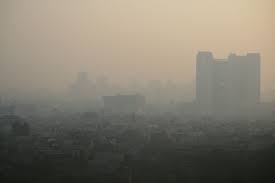London Long term exposure to ambient air pollution may heighten the threat of Covid-19 infection, suggests a exploration.
The study, published online in the journal Occupational and Environmental Medicine, showed that both Particulate matter (PM)2.5 and 10 were significantly associated with an increased Covid-19 infection rate.
Every 1 microgram/ boxy metre increase in long term exposure to PM2.5 was associated with a 5 per cent increase in the number of new cases of Covid-19 infection, original to 294 redundant cases per of the population/ time.
“ Our findings give the first solid empirical substantiation for the hypothesised pathway linking long- term exposure to air pollution with the prevalence of Covid-19, and earn unborn generalisation in different surrounds,” said Giovanni Veronesi from Department of Medicine and Surgery at University of Insubria, Italy.
“ Meanwhile, government sweats to further reduce air pollution situations can help to alleviate the public health burden of Covid-19,” Veronesi added.
While population viscosity was n’t associated with a heightened threat of infection, living in a domestic care home was associated with a further than10-fold heightened threat of the infection.
The associations were indeed more conspicuous among aged age groups, indicating a stronger effect of adulterants on the Covid-19 infection rate among 55-64 and 65-74 time pasts.
Still, as this is an experimental study, and as similar, ca n’t establish the cause, they said.
But long term exposure to air pollution also heightens the threat of respiratory and cardiovascular conditions through patient inflammation and compromised impunity. These same pathways may thus be involved in the link between air pollution and advanced Covid-19 infection rates, the experimenters noted.
Farther, medicine treatment for diabetes, high blood pressure, and obstructive airway conditions, as well as a history of stroke were also associated with, independently, a 17 per cent, 12 per cent, 17 per cent, and 29 per cent, heightened threat.
For the study, the platoon looked at long term exposure to airborne adulterants and patterns of Covid-19 infection from the launch of the epidemic to March 2021 among the residers of Varese, the eighth largest megacity in Lombardy – worst affected region in terms of both cases and deaths due to Covid.

